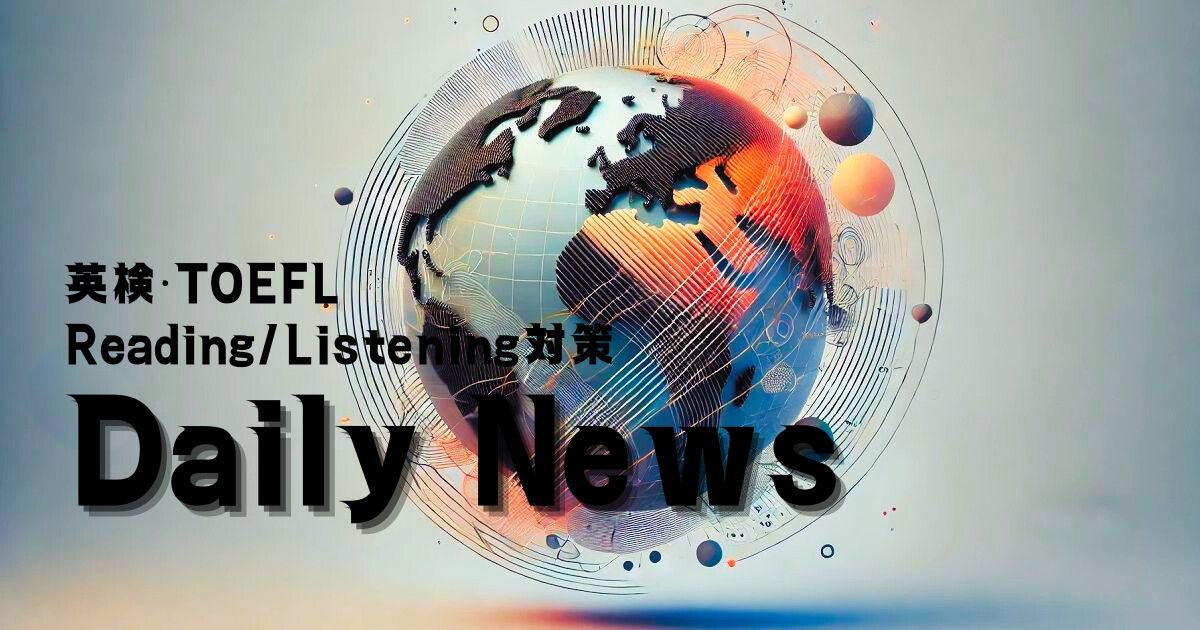📰Today’s article
Title
Trump Plans New Tariffs on 14 Countries
トランプ氏、14か国への新たな関税を計画
Article
| English | Japanese |
|---|---|
| President Donald Trump says he will start a new set of import taxes on goods from 14 countries, including Japan and South Korea. He plans a 25 % duty on their products, beginning 1 August, after a 90-day pause on earlier threats ends. Letters with the same warning were sent to each foreign leader. | ドナルド・トランプ大統領は、日本や韓国を含む14か国からの製品に対して、新たな輸入税を開始すると述べている。90日間の猶予期間が終了する8月1日から、対象製品に25%の関税を課す予定だ。同様の警告文が各国の首脳に送付された。 |
| Higher charges had first been due on 9 July but were delayed while the White House searched for trade deals. Trump wrote that the rates could go up or down “depending on our relationship”. He argues that the tariffs will shield American factories and jobs from unfair competition, calling the move “reciprocal” and necessary. | 本来、より高い関税は7月9日に発効する予定だったが、ホワイトハウスが貿易協定を模索している間に延期された。トランプ氏は、関税率は「関係次第で上下する」と記した。彼は、この関税措置が不公正な競争から米国の工場や雇用を守るとして、「相互的」で「必要な措置」と主張している。 |
| Many economists disagree, saying the plan will lift prices and limit trade. Shares fell on Monday, and Toyota’s US-listed stock slid 4 %. Japan shipped goods worth more than $148 billion to the United States last year, making it America’s fifth-largest supplier, while South Korea also ranks among the top ten exporters to the country. | 多くの経済学者はこの考えに反対しており、この計画は物価を上げ、貿易を制限するとしている。月曜日には株価が下落し、トヨタの米国上場株は4%下落した。昨年、日本はアメリカに1,480億ドル以上の商品を輸出しており、アメリカにとって5番目に大きな供給国となっている。韓国もまた、アメリカへの主要な輸出国トップ10に入っている。 |
| The president also listed other penalties: 40 % on items from Myanmar and Laos; 36 % on Thailand and Cambodia; 35 % on Serbia and Bangladesh; 32 % on Indonesia; 30 % on South Africa; and 25 % on Malaysia and Tunisia. White House press secretary Karoline Leavitt said more letters may appear soon and insisted the changing dates do not weaken the threat. | 大統領は他の制裁措置についても言及した。ミャンマーとラオスには40%、タイとカンボジアには36%、セルビアとバングラデシュには35%、インドネシアには32%、南アフリカには30%、マレーシアとチュニジアには25%の関税が課されるという。ホワイトハウスの報道官キャロライン・レビット氏は、さらに多くの通知が近く送られる可能性があると述べ、日程変更は脅威を弱めるものではないと主張した。 |
| When Trump first unveiled steep duties in April, market turmoil forced him to suspend the highest rates but keep a 10 % levy. Treasury Secretary Scott Bessent now expects “a busy couple of days” as offers arrive. So far the United States has reached deals with the UK, Vietnam and partly with China, while talks continue with India, the EU and others. | トランプ氏が4月に高率の関税を最初に発表した際、市場の混乱により最も高い関税は一時停止されたが、10%の関税は維持された。スコット・ベッセント財務長官は、提案が届く中で「数日間忙しくなる」と予測している。現在までに、アメリカはイギリス、ベトナム、中国(一部)と合意に達しており、インドやEUなどとの協議も続いている。 |
📘Vocabulary
- reciprocal – adjective
- Meaning: given and received in return
- Example: The countries agreed to a reciprocal exchange of goods.
- 意味:相互的な、互いに返礼のある
- 例文:両国は商品を相互に交換することに合意した。
- turmoil – noun
- Meaning: a state of great confusion or disorder
- Example: The news caused financial turmoil in the markets.
- 意味:混乱、騒動
- 例文:そのニュースは市場に金融混乱を引き起こした。
- levy – noun
- Meaning: an amount of money collected as a tax or fine
- Example: The government introduced a new levy on luxury goods.
- 意味:課税、徴収金
- 例文:政府は高級品に新たな課税を導入した。
- shield – verb
- Meaning: to protect someone or something
- Example: The measures are meant to shield workers from layoffs.
- 意味:守る、保護する
- 例文:その措置は労働者を解雇から守ることを目的としている。
- unveil – verb
- Meaning: to show or announce something publicly for the first time
- Example: The company unveiled its latest product at the event.
- 意味:発表する、初公開する
- 例文:その企業はイベントで最新の製品を発表した。
📝Let’s summarize
| Summary | 要約 |
|---|---|
| President Trump will impose 25% tariffs on imports from 14 countries starting August 1, after a delay. He claims this will protect American jobs, but economists warn of higher prices. Other countries face varied duties, while talks with trade partners continue. | トランプ大統領は、8月1日から14か国の輸入品に25%の関税を課す。彼はこれが米国の雇用を守ると主張しているが、経済学者たちは物価上昇を警告している。他の国々にもさまざまな関税が課され、貿易交渉は継続中である。 |
| Word Count: 39 words |
❓Comprehension Questions
Q1: What is the main reason President Trump gave for the new tariffs?
A. He wanted to improve relations with Asian countries.
B. He said they are needed to protect American factories and jobs.
C. He believed it would help Japanese exporters.
D. He planned to reduce import prices in the US.
問1: トランプ大統領が新たな関税を導入する主な理由は何ですか?
Correct answer: B
正解選択肢: 彼はアメリカの工場と雇用を守るために必要だと述べた。
該当文: He argues that the tariffs will shield American factories and jobs from unfair competition.
Q2: What happened to Toyota’s US-listed stock on Monday?
A. It went up by 4%.
B. It remained the same.
C. It dropped by 4%.
D. It was not traded.
問2: 月曜日にトヨタの米国上場株はどうなりましたか?
Correct answer: C
正解選択肢: それは4%下落した。
該当文: Shares fell on Monday, and Toyota’s US-listed stock slid 4 %.
Q3: What did Trump do when he first announced the high tariffs in April?
A. He kept the highest rates in place.
B. He delayed all tariffs until August.
C. He reduced all tariffs to 10%.
D. He paused the highest rates but kept a 10% levy.
問3: トランプ氏が4月に最初に高率関税を発表したとき、何をしましたか?
Correct answer: D
正解選択肢: 最も高い関税は停止したが、10%の関税は維持した。
該当文: Market turmoil forced him to suspend the highest rates but keep a 10 % levy.
💬Today’s your thoughts
Question
Do you think it is a good idea for countries to use tariffs to protect local jobs?
自国の雇用を守るために関税を使うのは良い考えだと思いますか?
Model Answer – 1(肯定的立場)
| English | Japanese |
|---|---|
| I think tariffs can help protect local jobs from unfair foreign competition. | 関税は不公正な外国との競争から国内の雇用を守るのに役立つと思います。 |
| Firstly, tariffs make imported goods more expensive, so people may choose to buy local products instead. This supports domestic industries and keeps jobs in the country. | 第一に、関税によって輸入品の価格が上がり、人々が国内製品を選ぶようになるかもしれません。これは国内産業を支え、雇用を国内に維持します。 |
| Secondly, companies that feel protected by tariffs may invest more in local factories and hire more workers. For instance, my uncle’s factory once expanded after similar protection measures were introduced. | 第二に、関税によって守られていると感じた企業は、地元の工場により多く投資し、雇用を増やすかもしれません。例えば、私の叔父の工場は、以前同様の保護措置が導入された後、拡大しました。 |
| In conclusion, although tariffs have risks, I believe they are useful for saving jobs if used carefully. | 結論として、関税にはリスクがありますが、慎重に使えば雇用を守るのに有効だと思います。 |
| [Word Count: 103 words] |
Model Answer – 2(否定的立場)
| English | Japanese |
|---|---|
| I do not think using tariffs is a good way to protect jobs. | 関税を使って雇用を守るのは良い方法だとは思いません。 |
| Firstly, tariffs often lead to higher prices for everyday products, which can hurt local consumers. This makes life harder for people who are already struggling with rising costs. | 第一に、関税は日用品の価格上昇につながり、地元の消費者にとって負担になります。これはすでに生活費の上昇に苦しんでいる人々の生活をさらに厳しくします。 |
| Secondly, if other countries respond with their own tariffs, it can damage exports and cause job losses in other industries. For instance, farmers in my region once suffered because of foreign tariffs on our produce. | 第二に、他国が報復関税を課せば、輸出産業が打撃を受け、他の業界で雇用が失われる可能性があります。例えば、私の地域の農家は、外国の関税で大きな損害を受けたことがあります。 |
| In conclusion, while tariffs might help some jobs, they can harm many others, so I believe they are not the right solution. | 結論として、関税が一部の雇用には役立つかもしれませんが、多くの人に悪影響を及ぼすため、正しい解決策ではないと考えます。 |
| [Word Count: 103 words] |
News Source: BBC News
https://www.bbc.com/news/articles/cd0vkl31085o

